
“The ongoing Sri Lanka-CERN cooperation could be further enhanced by involving other technical universities including in the engineering and information technology fields in the coming years”, said Minister of Science, Technology and Research, Skills Development and Vocational Training and Kandyan Heritage Dr. Sarath Amunugama at a discussion held with Ms. Charlotte Warakaulle, Director for International Relations, European Organization for Nuclear Research (CERN) in Geneva, during his visit to the CERN on 15 May 2018. Sri Lanka – CERN partnership has recorded considerable increase in the participation of doctoral candidates and physicists in critical particle physics experiments of CERN.
While commending CERN for enhanced cooperation with Sri Lanka during the past few years, the Minister emphasized the importance of the involvement of undergraduates, PhD candidates as well as scientists in CERN experiments. Ms. Warakaulle stated that such exposures would provide an important opportunity to bring back to Sri Lanka not only the much needed knowledge on particle physics but also useful insights in the latest advancements in high technology. Access to data generated in the experiments, would be extremely useful for universities to broaden their research capacities as well as for potential use in industries, she stressed.
It was agreed that collaboration would continue in the form of training for Sri Lankan physicists and students in CERN experiments as well as in various other CERN programmes such as the prestigious ‘Summer Student Programme’, paving the way for building the critical mass of scientific expertise in Sri Lanka in the field of high energy particle physics.
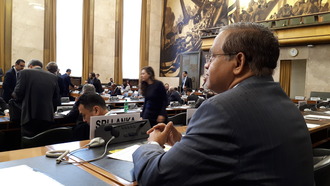
Delivering his initial address to the Conference of Disarmament (CD) of the United Nations, Ambassador Azeez stated that the inaction in the CD over the past twenty years has only led to the loss of a generation of professionals and experts in the field of Disarmament. He stressed “the gap in Disarmament Education is now all too glaring".
Thanking Sweden and Switzerland for giving leadership to the CD at this most crucial time, followed by Sri Lanka early this year, the Permanent Representative of Sri Lanka added that negotiations in the CD, by their very nature, involved addressing challenging issues, exchange of perspectives, and understanding.
The essential task of that process remained as one of endeavouring to achieve consensus outcomes. The eventual goal of general and complete disarmament underpinned the fulfilment of that task, he emphasised.
Permanent Mission of Sri Lanka
Geneva
22 May 2018
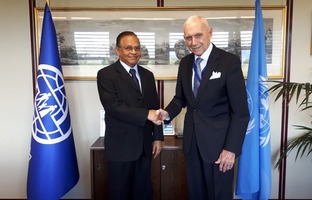
Permanent Representative of Sri Lanka to the United Nations in Geneva, Ambassador A.L.A Azeez, called on the Director General of the International Organisation for Migration (IOM) Ambassador William Lacy Swing. The IOM Chief commended Sri Lanka’s prominent role in promoting the Agenda on Migration Health, including by co-hosting the 2nd Global Consultation on Migration Health in Colombo in February 2017. The DG appreciated the statement delivered on behalf of the Hon. Minister of Health, at the recently held International Dialogue on Migration (IDM) in New York, which acknowledged the significant role that IOM was playing in advancing the SDGs.
Highlighting IOM’s enhanced collaboration with the Government of Sri Lanka, with the undertaking of varied programmes such as post-arrival migration health, border management strategy, and support for Sri Lanka migrants abroad, Ambassador Lacy expressed satisfaction at the current level of engagement which he referred to as having “grown exponentially in the past few years”. He further complemented Sri Lanka’s Chairmanship of the Abu Dhabi Dialogue (ADD) and its long held leadership to the Colombo Process (CP), calling it “one of the most vibrant Regional Consultative Processes (RCP) of IOM”.
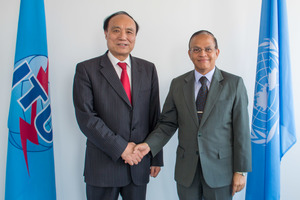
Welcoming Ambassador A.L.A. Azeez, the Permanent Representative of Sri Lanka in his office, Mr. Houlin Zhao, the Secretary-General of the International Telecommunication Union (ITU) recalled his previous visits to the “beautiful country”, long before he became the ITU Secretary-General. Referring to higher social indicators that Sri Lanka has achieved including in literacy, he complimented Sri Lanka for making considerable strides in the IT Sector. It was satisfying that Sri Lanka has been placed as an important hub in regional trade and economic networks, he said.
Ambassador Azeez apprised the Secretary-General on the policy initiatives by the Government to integrate ITU as a key element in its national endeavours to realize SDGs in Sri Lanka. He stressed that through the effective implementation of SDGs, supported by advances in IT, the Government of Sri Lanka has envisioned to enhance economic and development gains for all peoples. In this context he explained the policy initiatives taken by Sri Lanka to bring ICT into ‘Sri Lanka Sustainability Strategy 2030’ which is being finalized. He also recalled the ratification by the Government of Sri Lanka of the Budapest Convention on Cyber Crimes, which demonstrated Sri Lanka’s proactive involvement in promoting ICT within the country and abroad.
Ambassador Azeez expressed Sri Lanka’s full support and cooperation in making ICT a central element in the SDGs as ITU moved forward with implementation of the UN Development Agenda. He assured the Secretary-General that ITU’s efforts in forging greater partnership among Member States leading to a successful review of implementation of the UN Development Agenda in 2020,- five years after its adoption, would help further enhance ITU’s role and standing in the International Development Community.
Sri Lanka Permanent Mission
Geneva
21 May 2018
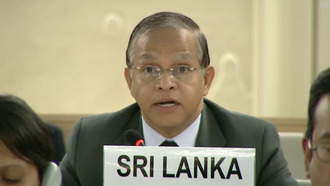
Permanent Representative to the United Nations in Sri Lanka Ambassador A.L.A. Azeez, delivering a Statement on behalf of the Government of Sri Lanka at the 28th Special Session of the Human Rights Council today, 18 May 2018, emphasized that the security of all civilians in the Occupied Palestinian Territory (OPT) should receive the utmost consideration and that their human rights should be upheld and protected at all times.
He further stressed "Diplomacy and political leadership still have immense potential to carry dialogue through to success if pursued diligently, having regard to the fundamentals of a Two State solution".
Full Statement , Sinhala, Tamil
Permanent Mission of Sri Lanka
Geneva
18 May 2018
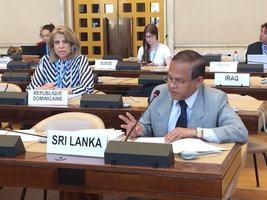
Addressing experts, Governments, and other participants at the Intersessional Expert Meeting on the full enjoyment of human rights by all women and girls and the systematic mainstreaming of gender perspective into the implementation of the 2030 Agenda, Ambassador A.L.A. Azeez, Permanent Representative of Sri Lanka to the United Nations in Geneva stated “It is incumbent on all stakeholders to strive to create a culture of respect for equality and non-discrimination and to work towards dispelling the myth of inferiority attributed to women over centuries”. He called for all stakeholders to work together to ensure a dignified life and a better future for all women and girls.
The Intersessional Expert Meeting began its two day session in Geneva today, with the opening remarks of Ms. Kate Gilmore, Deputy High Commissioner for Human Rights, followed by presentations by experts representing different UN agencies and an interactive dialogue.
“Carefully thought-through and targeted approaches geared to empowering women”, Ambassador Azeez stated, were “imperative for the effective advancement of development goals in national and international programmes.”
He emphasized that ensuring access to quality health services and quality education would significantly improve life chances and better employment opportunities for women and girls. “Such empowered women and girls can bring transformational improvements in the health and prosperity of families, communities, societies and nations they live in”, he remarked.
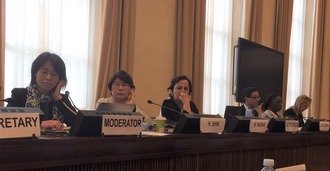
Sharing the experiences of Sri Lanka in recent times, he outlined the measures taken by the Government to address challenges faced by women, such as the adoption of a National Action Plan for prevention of gender based violence (GBV) and the National Human Rights Action Plan (2017-2021) as well as the enactment of legislation aimed at increasing women representation in local governing authorities.
Sri Lanka’s Permanent Representative reiterated that achieving gender equality was not just an issue of women and girls, and that it went way beyond, calling for the active involvement of all stakeholders.
Permanent Mission of Sri Lanka
Geneva
2 May 2018
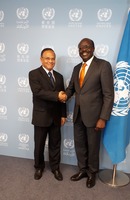
Ambassador A.L.A. Azeez, Permanent Representative of Sri Lanka to the United Nations in Geneva met with the Secretary General of the United Nations Conference on Trade and Development (UNCTAD) Dr. Mukhisa Kituyi at UNCTAD headquarters, on 30th April 2018. UNCTAD Secretary General appreciated Sri Lanka for the active role played and the productive contribution made towards the effective operationalization of the organization in its establishment phase as well as for the continued support and cooperation extended in the implementation of UNCTAD’s agenda and programmes.
Ambassador Azeez took the opportunity to reaffirm Sri Lanka's commitment to the work undertaken by UNCTAD, in particular towards facilitating and strengthening developing countries’ integration into the globalized economy and their implementation of the 2030 Agenda for Sustainable Development. He assured the UNCTAD Secretary General that Sri Lanka would further enhance its partnership and would proactively contribute to the ongoing activities of UNCTAD.
Having highlighted Sri Lanka’s continuing cooperation with UNCTAD on a number of prioroty areas such as Investment, Electronic Commerce, Science and Technology and Commodity Development, among others, Sri Lanka’s Permanent Representative projected Sri Lanka as an important venue for hosting multilateral and regional activities of UNCTAD in the future.
UNCTAD is a permanent intergovernmental body established by the United Nations General Assembly in 1964. Its primary mandate is to provide a forum to deal with issues relating to trade, investment, and development affecting progress and prospects for development of developing countries. UNCTAD, pursuant to this mandate, extends assistance to developing countries in their efforts to effectively integrate into the world economy on an equitable basis.
Sri Lanka Permanent Mission
Geneva
1st May 2018
